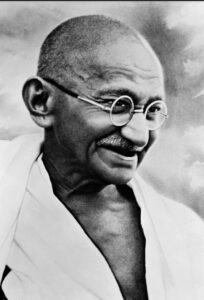Mahatma Gandhi (1869–1948) was an Indian lawyer and nationalist who led India’s independence through nonviolent resistance. He inspired global civil rights movements, and the honorific “Mahātmā,” meaning “great-souled,” was first given to him in South Africa in 1914.

Early Life
Mahatma Gandhi was called to the bar at the age of 22, having received his legal education in London’s Inner Temple after growing up in a Hindu household in coastal Gujarat. After struggling for two years in India, Gandhi moved to South Africa in 1893 to defend an Indian businessman. He spent the next twenty-one years living in South Africa.At 45, he returned to India in 1915 and mobilized farmers, workers, and peasants against discrimination and high taxes.
Assuming leadership of the Indian National Congress in 1921, Mahatma Gandhi led nationwide campaigns for easing poverty, expanding women’s rights, building religious and ethnic amity, ending untouchability, and, above all, achieving swaraj, or self-rule. Gandhi adopted the short dhoti woven with hand-spun yarn as a mark of identification with India’s rural poor. He lived in a self-sufficient community, ate simply, and used long fasts for introspection and political protest.
Bringing anti-colonial nationalism to the common Indians, Gandhi led them in challenging the British-imposed salt tax with the 400 km (250 mi) Dandi Salt March in 1930 and in calling for the British to quit India in 1942. He was imprisoned many times and for many years in both South Africa and India.
While raising a family here, Gandhi, in turn, used nonviolent resistance for the first time in his civil rights struggle.
In the early 1940s, Muslim nationalism threatened Gandhi’s vision of a pluralistic India. Despite gaining independence in August 1947, British India was split into Hindu-majority India and Muslim-majority Pakistan. Consequently, mass displacement led to religious violence, particularly in Bengal and Punjab. In response, Gandhi visited the impacted districts to ease suffering, bypassing the actual independence celebration.
Gandhi held several hunger strikes to end religious violence. At 78, he began his final one in Delhi on January 12, 1948.Some Hindus felt he favored Muslims and Pakistan too much. On January 30, 1948, Hindu nationalist Nathuram Godse shot him three times at a prayer gathering in Delhi.
Gandhi’s birthday, October 2, is celebrated as the International Day of Nonviolence and India’s national holiday, Gandhi Jayanti. In post-colonial India, he is honored as the Father of the Nation and was affectionately called Bapu.
